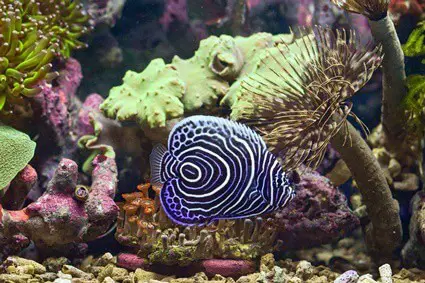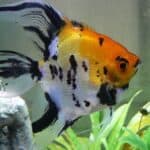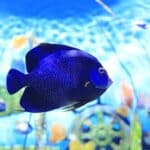Angelfish are an excellent addition to a community tank. Once they pair up with mates, they can coexist with other fish. Unfortunately, this changes once the angelfish start laying eggs.
Angelfish eggs don’t usually survive in a community tank. They’ll be harmed by conflict between their parents and other fish in the community tank.
They may also get eaten by other fish when their parents aren’t watching. Even the parents may consume the eggs if their tank mates stress them out.
Do Angelfish Guard Their Eggs?
The parents evolved a protective instinct to defend their eggs. They’ll ward off other fish and threats by:
- Swimming around the eggs protectively.
- Forming a territory around the clutch and patrolling it.
- Lunging at any fish that attempt to get near.
- Full-on attacking any fish that gets too close or tries to rush the eggs.
The parents will also tend to the eggs and work to ensure their successful hatching. This will involve:
- Picking away algae and fungi that grow on or near the eggs.
- Encouraging water flow over the eggs and boosting the oxygen they receive.
- Eating dead eggs that are at risk of infecting the clutch with fungus.
These are techniques that ensure the eggs have the best chance of survival.
However, there are times when angelfish parents stop being protectors. Instead, they become the main danger to the eggs. Parents are known to eat their young in the fry and egg stages.
The most dangerous place for angelfish eggs is still a community tank. Although their parents are there to protect them, they still face many dangers, such as:
- Bigger fish than the parents can force their way past.
- Fish that win a fight against the parents can attack the eggs.
- Fish that sneak in and eat the eggs while the parents are resting or distracted.
- Algae, bacteria, and fungi harm the eggs.
- Disturbances from fighting and activity cause damage to the eggs.
- The parents eat the eggs.
These dangers are most common in community tanks. The threats are reduced if you move the spawn and the adult angelfish to a different tank.
This will limit how much stress, conflict, and predators they encounter.
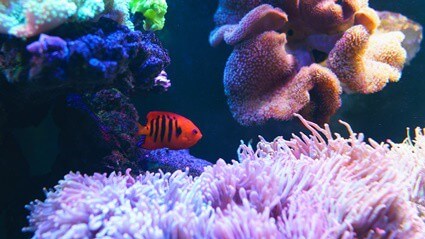
Why Do Angelfish Keep Eating Their Eggs?
Angelfish may consume their eggs for the initial 1-3 spawns. It’s unfortunate, but it’s not unexpected. The parents can be motivated to cannibalize their eggs due to factors like:
Lack of Food
If the angelfish don’t receive enough food, they’ll believe there’s a food shortage. This may result from other fish guarding the food or the owner not providing enough for everyone.
An adult angelfish knows that it can produce several clutches of eggs. For this reason, angelfish enduring food shortages may eat their eggs. This helps them to survive the ‘famine.’
Offer more food to the parents. If they have resources, they’re less likely to consume their eggs.
Excessive Stress
Angelfish have a tough job protecting their young in a community tank. That’s because:
- Docile fish will be curious and eager to investigate the eggs.
- Fish that don’t mean any harm could still eat the eggs for convenience.
- Aggressive fish may seek out the eggs and be willing to fight the parents.
Until the eggs hatch, continue through their fry development, and reach adulthood, they aren’t safe. It’s unlikely that the parents will be able to keep up.
This can result in a level of stress so high that your angelfish turn on their eggs. The smaller the tank and the more overcrowded it is, the more likely this becomes.
If you notice angelfish spawning in a community tank, do the following:
- Limit how many fish are near them, perhaps moving the parents or the more aggressive fish to a different tank.
- Consider a larger tank, especially one with multiple swimming levels.
- Provide more hiding places for the angelfish parents.
- Provide ample food so curious fish don’t eat their eggs.
Youth and Ignorance
When angelfish are new parents, they’re more likely to eat their eggs.
They may be so willing to attack everything that they destroy what they’re supposed to defend. Fortunately, most angelfish outgrow this habit after 1-3 spawns.
According to the Proceedings of the Zoological Society of London, angelfish have a low survival rate, so they lay many eggs.
A clutch may include between 150-200 eggs. Of those, only 30-40 may hatch, and then only 30% of those will reach adulthood.
Most angelfish never make it past the egg stage, let alone to maturity. Angelfish will lay enough eggs and go on to do so on many occasions, so they have time to learn from their mistakes.
Detecting Something Wrong With The Clutch
The parents may also know something you don’t. In some cases, they feed on the eggs to:
- Remove damaged eggs.
- Clear out extra eggs to provide aeration for the clutch.
- Clean away eggs that are infected by fungus.
While it’s rare for an entire clutch to go bad, it happens. If the angelfish parents are well-behaved and have no external stressors, cannibalism may have been a good decision.
How To Protect Angelfish Eggs
It’s possible to rear baby angelfish in a community tank, but it’s far more dangerous. You’re likely to have many eggs, fry, and juveniles get eaten in the following weeks.
The best way to protect angelfish eggs is by providing them with a new tank.
Wild angelfish have no choice but to rear their offspring in a community environment. However, there’s far more space in an ocean or river than in a tank.
Angelfish only have to contend with their natural neighbors, not whatever fish you introduce. That makes the aquarium more dangerous than the wild in some cases.
For this reason, it’s recommended to place the eggs in a separate tank.
You can relocate the parents to this new area, or you can leave them out if they pose a threat. Once the eggs hatch and develop into juveniles, they can be reintroduced to the group.
Here are tips for creating a safer environment for angelfish eggs:
Darken The Tank
Most tropical fish operate best in sunlight that filters in through the water. Providing a tank light is the most effective way to make them active and more likely to eat their eggs.
Try dimming the lights while the eggs incubate so the other fish become more docile.
Limit Activity
If the eggs continue to be eaten, limit the activity around your tank.
For example, move the tank away from doors, living rooms, or places with ample foot traffic. The movement, sound, and vibrations of heavy footsteps may unsettle the fish.
Only Trust Experienced Parents
Young parents are prone to getting their wires crossed or becoming stressed from outside activity.
If any angelfish are capable of handling the bustle of a full tank alongside raising their eggs, it’ll be the experienced parents who take it in their stride.
Provide Hiding Spots
Angelfish create a territory and protect it. If they’re given hiding places (for themselves and the eggs), they’re less likely to expand this territory. Otherwise, they may pick fights and harm the eggs.
Hiding places break the line of sight with other fish so the angels feel secure. They can also hide their eggs, giving them a better chance against opportunistic predators.
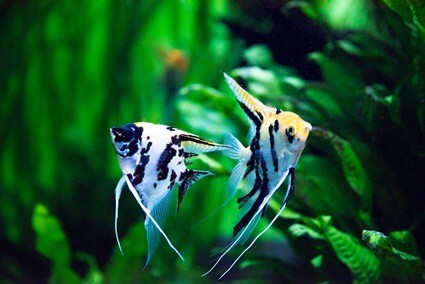
Paint The Tank
Angelfish parents may get overly riled by their reflection. They may also observe the reflections of other fish and feel surrounded, causing them to eat their eggs.
To prevent this, consider painting the bottom of the tank a dark color. You can also paint one side of the tank so the parents aren’t exposed on all sides.
Painting a spot near the clutch will ensure the angels feel safest in this locale.
Angelfish Fry Survival Rate
According to the Autonomous University of Sinaloa in Mexico, the survival rate of the fry varies from 50% to 66.3%. The likelihood of them surviving depends on:
- Protection level in their environment.
- Diet and food availability.
- Whether they’re placed in a fry basket and kept away from other fish.
If the fry swims freely in the tank, they’ll have a much lower survival rate.
If they’re not given a specific diet that helps their developing bodies, they may die. If their tank is overly active, too bright, and has strong currents, they’re also likely to perish.
If you want the angelfish fry to survive in a community tank, you must provide protection.
They’ll face many predators (including their parents) over the next few weeks. The more calm, well-fed, and secluded the tank inhabitants, the less eager they’ll be to eat angelfish eggs.

